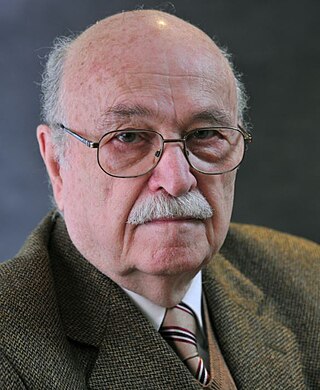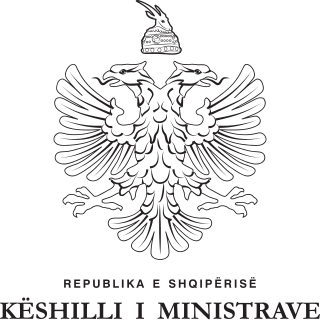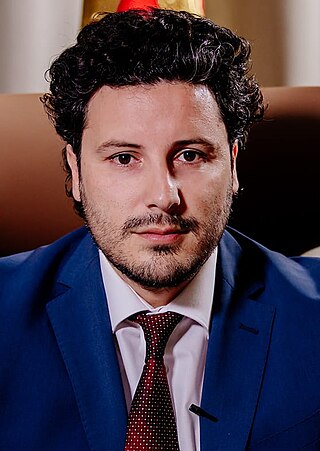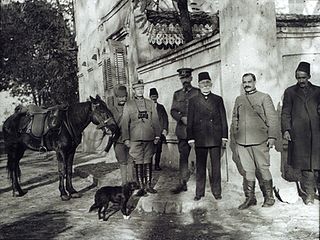| |||||
| Decades: | |||||
|---|---|---|---|---|---|
| See also: | Other events of 2015 List of years in Albania | ||||
The following lists events that happened during 2015 in the Republic of Albania .
| |||||
| Decades: | |||||
|---|---|---|---|---|---|
| See also: | Other events of 2015 List of years in Albania | ||||
The following lists events that happened during 2015 in the Republic of Albania .
Albania is a unitary parliamentary constitutional republic, in which the president of Albania is the head of state and the prime minister of Albania is the head of government in a multi-party system. The executive power is exercised by the Government and the prime minister with its Cabinet. Legislative power is vested in the Parliament of Albania. The judiciary is independent of the executive and the legislature. The political system of Albania is laid out in the 1998 constitution. The Parliament adopted the current constitution on 28 November 1998. Historically Albania has had many constitutions. Initially constituted as a monarchy in 1913, Albania became briefly a republic in 1925, and then a authoritarian monarchy in 1928. In 1939 Albania was invaded by Fascist Italian forces, imposing a puppet state, and later occupied by Nazi German forces. Following the partisan liberation from the Nazis in 1944 a provisional government was formed, which by 1946 had transformed into a communist one-party state. In March 1991 democracy was restored with multi-party elections.

The prime minister of Albania, officially the prime minister of the Republic of Albania, is the head of government of Albania. The office of the prime minister is a core institution in the politics of Albania formed after the Albanian declaration of independence on 28 November 1912. Since that time, the nation has navigated a dynamic political evolution spanning distinct periods, encompassing a monarchy, a communist regime and the eventual democratic order. In 1912, Ismail Qemali was inaugurated as the first prime minister of Albania, guiding the nation toward sovereignty amidst the complex conditions in the Balkans. In 1944, Enver Hoxha implemented a radical change in government, transforming Albania into an authoritarian and isolationist communist regime. In 1991, the nation transitioned into a democracy that marked a notable shift, when Fatos Nano emerged as the first post-communist prime minister of Albania.

Edi Rama is an Albanian politician, painter, writer, former university lecturer, publicist and former basketball player, who has been serving as the 33rd and incumbent Prime Minister of Albania since 2013 and chairman of the Socialist Party of Albania since 2005. He was appointed Minister of Culture, Youth and Sports in 1998, an office he held until 2000. First elected mayor of Tirana in 2000, he was reelected in 2003 and 2007.

Aleksandër Gabriel Meksi is an Albanian archaeologist and politician who served as the 28th Prime Minister of Albania from April 13, 1992, to March 11, 1997. A former archaeologist, he was the first person to be prime minister of Albania after the end of communist rule. Meksi was a member of the Democratic Party of Albania and took office at the same time as President Sali Berisha, who also belonged to that party. Before entering politics, Meksi was a researcher and restorer of monuments of medieval architecture.

International governments are divided on the issue of recognition of the independence of Kosovo from Serbia, which was declared in 2008. The Government of Serbia does not diplomatically recognise Kosovo as a sovereign state, although the two countries have enjoyed normalised economic relations since 2020 and have agreed not to try to interfere with the other's accession to the European Union.

The Government of Kosovo exercises executive authority in the Republic of Kosovo. It is composed of government ministers, and is led by the prime minister. The prime minister is elected by the Assembly of the Republic of Kosovo. Ministers are nominated by the prime minister and then confirmed by the assembly.
The fall of communism in Albania, the last such event in Europe outside the Soviet Union, started in December 1990 with student demonstrations in the capital, Tirana, although protests started in January that year in other cities like Shkodra and Kavaja. The Central Committee of the communist Party of Labour of Albania allowed political pluralism on 11 December and the largest opposition party, the Democratic Party, was founded the next day. March 1991 elections left the Party of Labour in power, but a general strike and urban opposition led to the formation of a "stability government" that included non-communists. Albania's former communists were routed in elections in March 1992 amid economic collapse and social unrest, with the Democratic Party winning most seats and its party head, Sali Berisha, becoming president.

The Ministry for Europe and Foreign Affairs is a department of the Albanian Government, in charge of diplomacy, foreign policy and the process of admission of Albania into the European Union. The ministry also provides support to Albanian citizens residing abroad. In September 2017, the ministry was restructured and it was merged with the Ministry of European Integration.

The Provisional Government of Albania, also called the Qemali Government, was the first government of Albania, created by the Assembly of Vlorë on 4 December 1912. It was a paternal government, led by Ismail Qemali, until his resignation on 22 January 1914, followed by the International Control Commission until the proclamation of the Principality of Albania.

The Council of Ministers is the executive branch that constitutes the Government of Albania. The Council is led by the Prime Minister of Albania. The prime minister is nominated by the President from among those candidates, who enjoy majority support in the Parliament; the candidate is then chosen by the Parliament. In the absence of the prime minister, the Deputy Prime Minister takes over his functions. There are 19 other government members, serving as deputy prime ministers, government ministers or both; they are chosen by the prime minister and confirmed by the Parliament.
The following lists events that happened during 1944 in the People's Republic of Albania.
The following lists events that happened during 1945 in the People's Republic of Albania.
The following lists events that happened during 2004 in Republic of Albania.
The following lists events that happened during 2002 in Republic of Albania.
The following lists events that happened during 2001 in Republic of Albania.
The following lists events that happened during 1999 in Republic of Albania.

Dritan Abazović is a Montenegrin politician who served as Prime Minister of Montenegro and as acting Minister of Foreign Affairs from 2022 to 2023. An ethnic Albanian, he heads the United Reform Action party. He previously served as deputy prime minister in the cabinet of Zdravko Krivokapić from 2020 until 2022.
The following lists events that happened during 1998 in Republic of Albania.
The following lists events in the year 2017 in Albania.

The Përmeti I Government was the 2nd ruling government of Albania, formed on 14 March 1914, following the arrival of Prince Wied in the country.